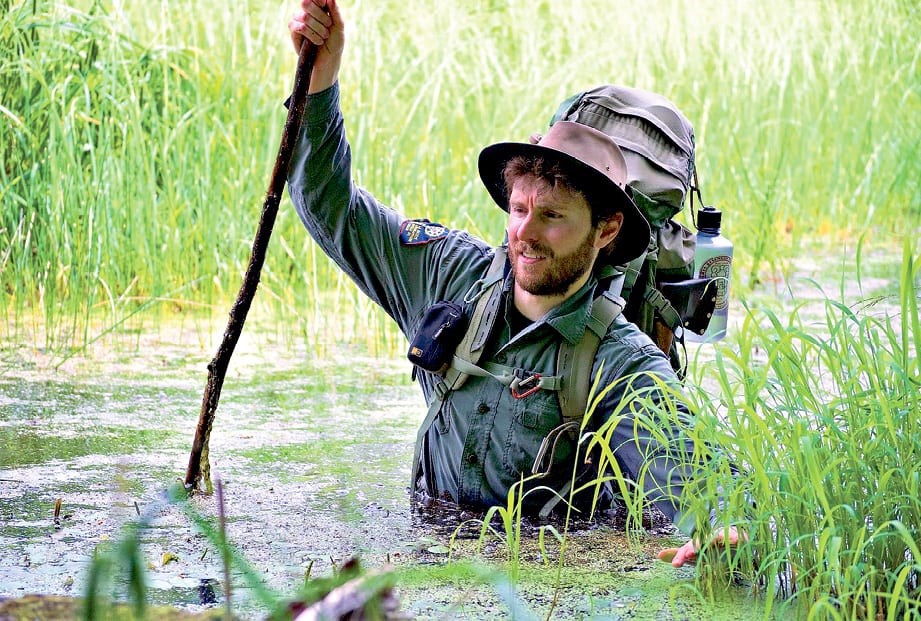Given position for his wilderness adventuring, writing
BY VOICE STAFF
Fenwick native and wilderness explorer Adam Shoalts was named an explorer-in-residence at the Royal Canadian Geographical Society (RCGS) at a ceremony in Toronto in February.
Shoalts, who was elected a fellow of the society in 2013, became known internationally after navigating a previously uncharted river in the Hudson Bay lowlands, an experience he wrote about in his bestselling book, Alone Against the North. Renowned storm-chaser George Kourounis was also named to serve alongside Shoalts.
To mark Canada’s sesquicentennial in 2017, Shoalts completed a solo 4000-kilometre journey across the territories, beginning in the Yukon and ending in Baker Lake, Nunavut.
“The explorer-in-residence positions are really new, so even I don’t know what it fully involves,” said Shoalts last week. “The first one was appointed in 2016—Jill Heinerth, an underwater cave diver. Now that I was chosen along [with a stormchaser], they're really covering all their bases."
Shoalts said that he appreciates that the RCGS also has a wide range of fellows, so as to encompass the many types of explorers.
"It's such a broad term—there are underwater explorers, nautical explorers, polar explorers, river explorers. There's space exploration, too. Roberta Bondar is a vice-president of the society and she's an astronaut."
"I love talking to astronauts, but I'd never want to go to space," he said. "That's just another level entirely."
Shoalts specializes in arctic and sub-arctic expeditions, and his recent work has mostly been solo, a far cry from the many thousands of people and advanced technology needed for space exploration.
"The expedition in Alone Against the North was a cartographic one. But I'm also an archaeologist," said Shoalts, who has nearly finished a PhD at McMaster University.
When announcing his appointment on Facebook, Shoalts joked that this position would mean that he'd be giving up the notoriously difficult trips he undertakes.
"My days hacking through trackless swamps, swatting hordes of blackflies, or drifting on ice floes are over! Just kidding, I'll be doing more of that than ever," he wrote.
Shoalts said that he hopes to use the public profile that accompanies his new position to continue what he has done over past years—write books and advocate for Canada's natural areas. He often speaks publicly, and said that he is always trying to draw attention to the threats to Canada's natural spaces, particularly that of urban sprawl.
“Why is it that when the population doubles we can add a McDonald’s to meet demand, but can’t have a bigger park?” he told the Voice last fall.
Shoalts’ latest book, A History of Canada in Ten Maps, was long-listed for the RBC Taylor Prize for non-fiction, and Shoalts has already begun work on another book, this one on his expedition last summer.
“I'm also planning to write a book about a lost explorer, trying to solve the mystery of what happened to him," said Shoalts.
The book project will involve a voyage by Shoalts to retrace the path of the explorer, in an effort to find lingering evidence of the original passage.
"It's really remarkable how little-known this explorer is. He was reported on in the New York Times at the time, but now he doesn't even have a Wikipedia page or a book about him. I'm getting the chance to do that."
Shoalts was deliberately reluctant to give the man’s name.
“I have said it before, but I do keep telling everyone that it’s a secret,” he said.
On other upcoming expeditions, Shoalts intends to shoot more wildlife photos.
"It's something that I've been wanting to do, and as my camera equipment has gotten better I'll be able to take better pictures of animals in their natural habitat," he said. "I'll be looking for rare wildlife, like the Easter Cougar and the Black Rat Snake."
Last month Shoalts was a fellow-on-board an RCGS One Ocean Expedition to Antarctica, where he gave talks and served as a resident expert.
“It was really interesting to see the wildlife and the different sort of landscape,” said Shoalts.
Shoalts has visited the high-latitude arctic, and said that while it is nice to be somewhere without bugs, he still prefers the sub-arctic.
But he did not rule out a future polar expedition, saying, “Anything’s possible.”



